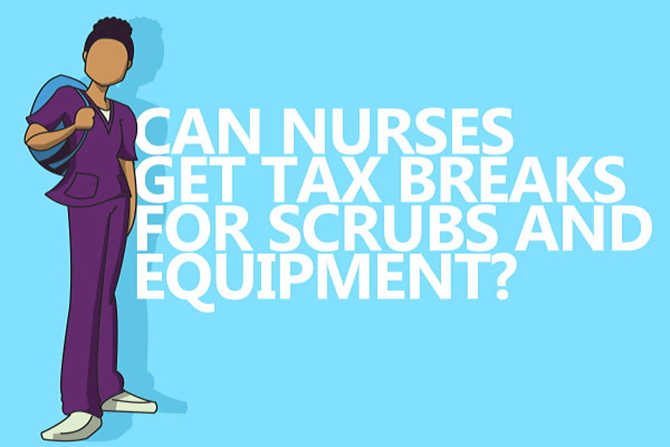Tax Deductions and Write-offs for Nurse Practitioners, Physician’s Assistants, and Registered Nurses
by Susannah McQuitty

You got this—all you have to do is start!
We make filing taxes delightfully simple with one, flat–rate price. Every feature included for everyone.
Start filing
If you’re in the medical field, finding tax breaks may not be as difficult as you think. While some of you should use a tax professional because your financial situation is more complicated, others may find that their taxes are pretty straightforward. Let’s review some of the core concepts that impact your tax situation and how to pull together some tax relief.
To keep things simple, we’re going to refer to nurses below, but this content largely applies to physician’s assistants (PAs) as well.
Are you an employee or an independent contractor?
Some nurses are considered employees of the healthcare institution where they work, while others are actually hired as independent contractors. It may not seem like a big deal, but your taxes will be calculated differently for each—especially after the recent tax reform laws.
Employees will fill out a W-4 upon being hired to establish how much tax should be withheld by their employer each pay period before they receive their wages in the form of a check or direct deposit. Those withholdings are sent to the federal government (and state, as applicable). At tax time, employees will receive a W-2 to help file their taxes.
Independent contractors, on the other hand, will fill out a W-9 for each practice (institution, clinic, hospital, etc.) they perform services for. This allows each practice to properly report information to the IRS and send a 1099-NEC to the contractor at tax time. Contractors typically bill or invoice the practice for completed work, and once they’ve been paid, make quarterly estimated tax payments to the federal government (and state, if applicable).

Can nurses get tax breaks for scrubs and equipment?
If you’ve been in the nursing business since before 2017, you remember the days when necessary work items like uniforms and equipment could save even W-2 employees money on their taxes (as long as your employer didn’t reimburse you for those expenses).
All of that’s changed, however. See, the Tax Cuts and Jobs Act of 2017 (TCJA) boosted the standard deduction for everyone—instant tax savings automatically for many taxpayers. But in order to raise the standard deduction, the TCJA got rid of some other tax breaks.
Starting in tax year 2018, nurses who are employees can no longer deduct their work-related expenses on Schedule A, even if their employer doesn’t reimburse the expense. This deduction for unreimbursed employee expenses was eliminated as part of the TCJA. (Now, some states actually still let you deduct out-of-pocket expenses from your state tax return, so check out your state’s Department of Revenue site to see where you fall.)
What about tax breaks for nurses who are independent contractors?
Independent contractors can deduct their work-related expenses, which are reported on Schedule C, not Schedule A (for itemized deductions). These expenses might include home office equipment, gas for a personal vehicle, computers, phone bills, and so on. Other big items include nursing-specific expenses, like:
- Malpractice/liability insurance
- Medical equipment
- Medical billing service
To deduct these expenses from income, you’ll need to keep good records (and it may be worth setting up work-specific credit and debit cards to maintain separate “business” records).

Self-employment taxes for freelance nurses
A quick note for independent contractors: You are technically considered self-employed, which means the self-employment (SE) tax applies to any income you make as a nurse.
SE tax is the amount you pay for Social Security and Medicare taxes, and since you’re both the employee and employer, you’ll be paying almost twice what you’d normally pay if you were a regular employee. That adds up quickly, but don’t lose heart—you can deduct half of your SE taxes on your federal tax return, which brings your total back down a bit.
Tax breaks for ongoing nursing education
Both employees and independent contractors in the nursing field can get tax breaks for continuing education. The Lifetime Learning Credit is geared toward any taxpayers pursuing education after the first four years of an undergraduate degree.
Usually employees have financial help from their employer, but any tuition or fees that aren’t reimbursed could qualify you for the Lifetime Learning Credit. Since independent contractors won’t have reimbursements from an employer, they are more likely to be able to claim the full Lifetime Learning Credit.
What sort of work-related records should nurses gather?
If you’re an employee, grab your W-2 and don’t worry about saving receipts for expenses throughout the year. Instead, look into maxing out your contributions to an employer-benefit retirement plan such as a 401(k), 403(b) investing benefits, or fringe-benefit “Flex Accounts” that allow the nurse to purchase fitness, daycare and commuting services with pre-tax dollars. You could also contribute to a personal IRA (Individual Retirement Account) or HSA (Health Savings Account) if eligible, since contributions can often reduce taxable income.
If you’re an independent contractor, keep careful and exhaustive records of all your business-related expenses throughout the year (including uniforms, travel, equipment, licensing fees, etc.) so you can deduct them from your income on Schedule C.
Filing your taxes
So what does the actual tax-filing process actually look like for nurses? Honestly, not that much different from anyone else. Sure, you’ll have different types of records to gather before sitting down to do your taxes, but you can file online just as well as the next person.
Once you’ve set aside your records throughout the year, the hardest part is over. Nurses who are employees will file like other employees, independent contractors will file like other freelancers and small-business owners, and anyone can file with 1040.com—the smart and simple way!
Sign up for more of this.
Subscribe to our blog for year–round finance strategies and tax tips. We’re here to remove the dread from filing taxes.










